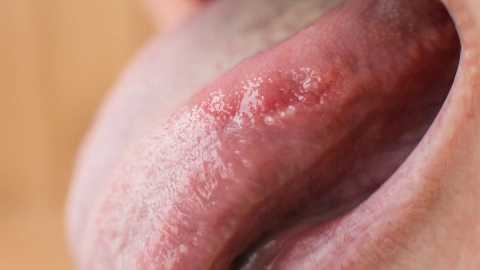Conditions Oral thrush (oral candidiasis)
ICD codes: B37 What are ICD codes?
If a person’s mouth constantly feels furry, it may be caused by oral thrush. It is rarely dangerous, but often very unpleasant. A weakened immune system makes a person more susceptible to oral thrush. Find out more.
At a glance
- Oral thrush is a condition that is not necessarily identified at first glance.
- The infection is caused by yeast (candida), and the most common pathogen is a fungus called Candida albicans.
- Oral thrush is usually harmless, but it can be very unpleasant and badly impair a person’s quality of life.
- The fungus can spread particularly easily when a person’s immune system is weak.
- Other factors, such as dentures, diabetes mellitus, and certain drugs, can also favor oral thrush.
Note: The information in this article cannot and should not replace a medical consultation and must not be used for self-diagnosis or treatment.

What is oral thrush?
Oral thrush is usually caused by a yeast (candida). The most common pathogen is the Candida albicans fungus. The condition is also known as oral candidiasis.
The fungus settles in the mucous membrane in the oral cavity, and it can be found in many people without them getting ill. Under certain conditions, however, the fungus can accumulate in large quantities, for example if the immune system is weakened by a serious illness, or as a side effect from certain drugs.
Oral thrush cannot necessarily be identified at first glance. It is usually harmless and not always painful. However, it can be very unpleasant and badly impair the person’s quality of life.
What are the symptoms of oral thrush?
The typical sign of oral thrush is a white deposit on the affected mucosa in the mouth and throat. These deposits can be scraped off with a wooden spatula, and beneath there are red, inflamed areas, often bleeding slightly.
Despite good oral hygiene sufferers constantly have a furry feeling in the mouth. The sense of taste changes, too, and there is sometimes soreness or a burning sensation on the tongue. These symptoms make eating and drinking more difficult. If the oral thrush is bad, swallowing and talking can also be difficult.
What causes oral thrush?
Oral thrush usually occurs as a result of illnesses or as a side effect of a treatment. A fungal infection is often a complication resulting from cancer treatment, in particular. Chemotherapy can cause the mucous membranes to be attacked and the immune system weakened – this makes it easier for the fungus to spread. Radiotherapy in the head/neck area also increases the risk. The risk of getting a fungal infection increases with the intensity of the treatment.
But other factors can favor oral thrush, too. These include, for example, dentures, diabetes mellitus and certain medications such as broad-spectrum antibiotics that are administered over several weeks. It can become easier for a fungal mouth infection to occur when the body and immune system are weakened. This is the case with people with HIV/AIDS, for instance. Care recipients who are generally weak, who do not eat or drink much, or require artificial feeding, are at particular risk.
How can oral thrush be prevented?
Healthy people do not have to do anything to prevent oral thrush. People at greater risk can take action to protect themselves. Someone in an at-risk group, for example due to a cancer treatment or a HIV/AIDS illness, can take so-called antifungals as a preventive measure. Antifungals are drugs that inhibit fungal growth or kill fungus.
To date there has not been enough research into other measures that can protect against oral thrush. Practicing good oral hygiene is the best way to give the mouth added protection.
Further information, for example about how to prevent oral thrush, can be found at gesundheitsinformation.de.

How is oral thrush diagnosed?
Anyone who is at risk of oral thrush needs to quickly tell their doctor or nurse if they have burning sensations or soreness in their mouth. An examination will then verify whether it is a fungal infection. If it is unclear, the mucous membrane deposit will be swabbed with a sterile cotton wool wad and tested in the laboratory.
People with cancer or HIV/AIDS should have their mouth examined regularly. This will identify any infection at an early stage. People can also examine their mouth themselves in the mirror to see whether there are any changes such as a white deposit or inflammation. Loved ones or nurses can help with this, too.
How is oral thrush treated?
Fungal infections are treated with antifungals. Some medications are applied directly (locally) to the areas affected. Others are swallowed or drunk – they then spread through the entire body (systemic). Some of the medication applied locally also gets into the gastrointestinal tract via saliva. Some of this is absorbed there and then also spreads through the entire body.
Studies with cancer and HIV/AIDS patients show that antifungals are probably more effective if they are swallowed rather than applied. However, they can also cause side-effects such as headaches, rashes, nausea, bloating, and diarrhea.
Which antifungal is suitable for a therapy depends on the patient. The state of health and the severity of the infection determine the choice. The drugs are usually taken over a period of 1 to 2 weeks.
To protect sore areas in the mouth, the diet can be adjusted – for example, by switching to soft foods, avoiding hot and alcoholic beverages, and using honey in place of sugar as a sweetener.
- Ai R, Wei J, Ma D, Jiang L, Dan H, Zhou Y et al. A meta-analysis of randomized trials assessing the effects of probiotic preparations on oral candidiasis in the elderly. Arch Oral Biol 2017; 83: 187-192. Aufgerufen am 23.08.2024.
- Carvalho CG, Medeiros-Filho JB, Ferreira MC. Guide for health professionals addressing oral care for individuals in oncological treatment based on scientific evidence. Support Care Cancer 2018; 26(8): 2651-2661. Aufgerufen am 23.08.2024.
- Clarkson JE, Worthington HV, Eden OB. Interventions for preventing oral candidiasis for patients with cancer receiving treatment. Cochrane Database Syst Rev 2007; (1): CD003807. Aufgerufen am 23.08.2024.
- Deutsches Krebsforschungszentrum (DKFZ), Krebsinformationsdienst (KID). Fieber bei Krebs: Beschwerden und Behandlungsmöglichkeiten. 2021. Aufgerufen am 23.08.2024.
- Deutsches Krebsforschungszentrum (DKFZ), Krebsinformationsdienst (KID). Mund- und Zahnpflege bei Krebs. 2010. Aufgerufen am 23.08.2024.
- Lyu X, Zhao C, Yan ZM, Hua H. Efficacy of nystatin for the treatment of oral candidiasis: a systematic review and meta-analysis. Drug Des Devel Ther 2016; 10: 1161-1171. Aufgerufen am 08.06.2020.
- Pankhurst CL. Candidiasis (oropharyngeal). BMJ Clin Evid 2013: 1304. Aufgerufen am 23.08.2024.
- Peterson DE, Boers-Doets CB, Bensadoun RJ et al. Management of oral and gastrointestinal mucosal injury: ESMO Clinical Practice Guidelines for diagnosis, treatment, and follow-up. Ann Oncol 2015; 26 (Suppl 5): v139-151. Aufgerufen am 23.08.2024.
- Pienaar ED, Young T, Holmes H. Interventions for the prevention and management of oropharyngeal candidiasis associated with HIV infection in adults and children. Cochrane Database Syst Rev 2010; (11): CD003940. Aufgerufen am 23.08.2024.
- Worthington HV, Clarkson JE, Khalid T et al. Interventions for treating oral candidiasis for patients with cancer receiving treatment. 2010; (7): CD001972. Aufgerufen am 23.08.2024.
- Yang C, Gong G, Jin E et al. Topical application of honey in the management of chemo/radiotherapy-induced oral mucositis: A systematic review and network meta-analysis. Int J Nurs Stud 2019; 89: 80-87. Aufgerufen am 23.08.2024.
- Zhang LW, Fu JY, Hua H et al. Efficacy and safety of miconazole for oral candidiasis: a systematic review and meta-analysis. Oral Dis 2016; 22(3): 185-195. Aufgerufen am 23.08.2024.
In cooperation with the Institute for Quality and Efficiency in Health Care (Institut für Qualität und Wirtschaftlichkeit im Gesundheitswesen – IQWiG).
As at:


